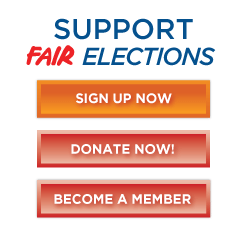California voters gained the power to place measures on the
ballot a century ago to break the grip of wealthy interests
controlling government. Initially, the requirement to
gather large number of petition signatures ensured that
only measures with broad popular support would make it to
the ballot.
Now paid signature gatherers qualify any measure, for a
price. It's largely wealthy companies and rich individuals
who wrote the 11 state measures Californians voted on
Tuesday.
Do you have $1 million to spare? No? Then your money didn't
matter much in the ballot measure campaigns. There were
just 47 funders who spent $1 million or more on the
campaigns, but their funds made up a whopping 80 percent of
all funds raised.
Three common-sense changes to California's ballot measure
system would make citizens' voices count more and big bank
accounts count less.
First, television ads should display the top three funders
on the lower third of the screen, in plain white type on a
black background, for the entire length of the ad. All
other political advertising should prominently display the
top three funders of the ad as well. The ads should show
the original source of the funds, not innocuously named
front groups for money laundering.
Campaign advertisements are often biased and misleading,
but the financial supporters of measures are facts.
Requiring prominent transparency in advertising will help
voters evaluate the credibility of the messenger as well as
the message, decreasing the influence of those seeking to
buy a law.
The California Disclose Act, which included some of these
transparency provisions, was narrowly defeated in the
Assembly earlier this year. In the wake of the $372 million
contributed to California ballot measures to date,
including scandalous anonymous donations, a stronger
version of the Disclose Act will return to Sacramento with
more strength and citizen support.
Second, we should not allow paid signature gatherers to be
paid by the signature, and petitions should prominently
display whether they are being circulated for pay or by
volunteers. These changes would keep voters informed about
the monied influence behind a potential measure, and make
it harder for wealthy interest groups to qualify ballot
measures that lack genuine public support.
Gov. Jerry Brown vetoed a bill last year that would have
prevented signature gatherers from being paid by the
signature, but with increasing citizen disgust at
money-dominated politics this measure is ripe to
return.
Third, the five-month window to gather signatures is simply
too short to qualify ballot measures using all volunteers.
Increasing this window to one year would make it possible
for ballot measures with broad popular support to qualify
for the ballot using all-volunteer signature campaigns.
This change would open up a window for citizen ballot
measures -- measures backed by popular support, popular
concern or popular desire to see change in our state.
With these three changes, big checkbooks would still speak
loudly on the ballot but the collective voices of citizens
would be speaking as well.
Daniel G. Newman is the co-founder and president of
MapLight and is a 2011-13 network fellow at the Edmond J.
Safra Center for Ethics at Harvard University. He wrote
this article for this newspaper.




